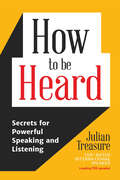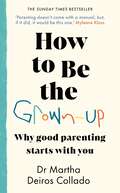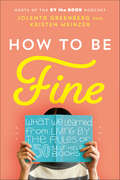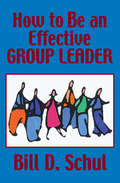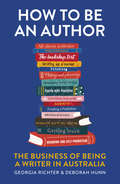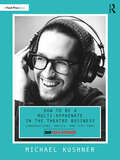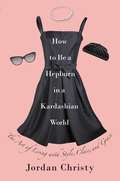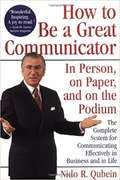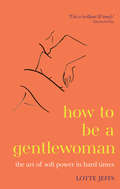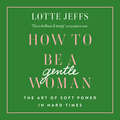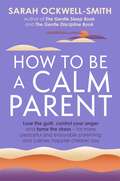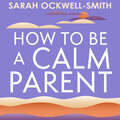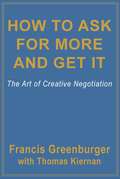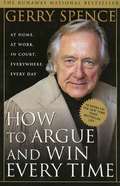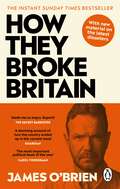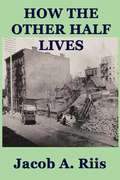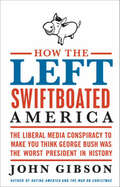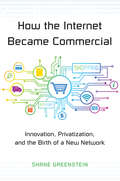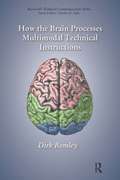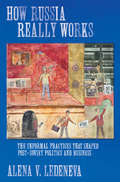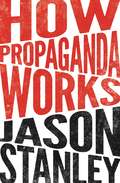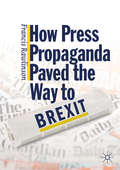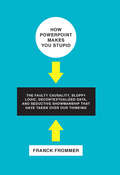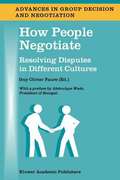- Table View
- List View
How to be Heard: Secrets for Powerful Speaking and Listening
by Julian TreasureA leading Ted Talk speaker shares the secrets to being a better communicator in this accessible and informative guide. Have you ever felt like you&’re talking, but nobody is listening? Renowned five-time TED Talk speaker and author Julian Treasure reveals how to speak so that people listen—and how to listen so that people feel heard. As this leading sound expert demonstrates via interviews with world-class speakers, professional performers, and CEOs at the top of their field, the secret lies in developing simple habits that can transform your communication skills, the quality of your relationships, and your impact in the world.How to be Heard includes never-before-seen exercises to help you develop communication skills that are as effective at home as in the boardroom or conference call. Julian Treasure offers an inspiring vision for a world of effective speaking, listening, and understanding.Secrets of communication skills and tips discussed in How to be Heard include:· How to make sound work for you · Why listening matters · The four cornerstones of powerful speaking and listening · How to avoid the seven deadly sins of speaking and listening · How to listen and why we don&’t · The power of your vocal toolbox and tricks of great speakers · Exercises and methods to achieve clarity, precision and impact · How to deliver a great talkHuffPost 20 Best Business Books of 2017 2019 Audie Award Winner for Best Audio Book in Business and Personal Development Winner of the Best Voiceover-Audiobook Narration at the 2018 Voice Arts Awards Perfect for readers of Talk Like TED, Simply Said, Just Listen, or How to Win Friends and Influence People
How to Be The Grown-Up: Why Good Parenting Starts with You
by Dr Martha Deiros ColladoINSTANT SUNDAY TIMES BESTSELLER‘Parenting doesn’t come with a manual, but if it did, it would be this one.’ MYLEENE KLASS'How to Be the Grown-Up has already become my favourite parenting handbook. Every parent needs this.’ DAISY LOWEDrawing on her years of experience as a clinical psychologist, as well as her growing and dedicated social media community, Dr Martha Deiros Collado's first book is the must-have toolkit for any parent.Martha understands the many modern-day parenting struggles and worries we all face:How can I make my child listen to me?Can I stop a tantrum in its tracks?What can I do when my child feels sad?Why does my child only eat three very particular things without having a meltdown?What should I do when I lose my sh*t?With humour, boundless energy, wit and warmth, Dr Martha tackles it all; from how to talk about honesty and lies, death, co-parenting, consent, gender, attachment, boundaries, and tantrums, as well as the small but critical day to day challenges parents face. And she explains why beneath each dilemma, it's the behaviours and scripts we learned as children that shape the parents we become.This deceptively simple and always empathetic guide promises to become the new word of mouth 'must have' for parents or any grown-up interested in what makes a healthy, happy, confident parent and child.‘Martha is my go-to expert for parenting. This book is full of real life examples, lived experiences, useful strategies and so much reassurance.’ Charlotte Stirling-Reed, bestselling author of How to Wean Your Baby‘Down to earth, anchored in compassion and completely do-able, Dr Martha gives real answers to all the questions every parent wants to know.’ Suzy Reading, chartered psychologist, author of Stand Tall Like a Mountain‘This book is an essential guide for all parents. Empowering, empathetic and educational. It has helped me to think more deeply about my own parenting, and understand myself better.’ Clare Bourne, author of Strong Foundations
How to Be Fine: What We Learned from Living by the Rules of 50 Self-Help Books
by Jolenta Greenberg Kristen MeinzerA humorous and insightful look into what advice works, what doesn’t, and what it means to transform yourself, by the co-hosts of the popular By the Book podcast.In each episode of their podcast By the Book, Jolenta Greenberg and Kristen Meinzer take a deep dive into a different self-help book, following its specific instructions, rules, and advice to the letter. From diet and productivity to decorating to social interactions, they try it all, record themselves along the way, then share what they’ve learned with their devoted and growing audience of fans who tune in.In How to Be Fine, Jolenta and Kristen synthesize the lessons and insights they’ve learned and share their experiences with everyone. How to Be Fine is a thoughtful look at the books and practices that have worked, real talk on those that didn’t, and a list of philosophies they want to see explored in-depth. The topics they cover include:Getting off your deviceEngaging in positive self-talkDownsizingAdmitting you’re a liarMeditationGoing outsideGetting in touch with your emotionsSeeing a therapistBefore they began their podcast, Jolenta wanted to believe the promises of self-help books, while Kristen was very much the skeptic. They embraced their differences of opinion, hoping they’d be good for laughs and downloads. But in the years since launching the By the Book, they’ve come to realize their show is about much more than humor. In fact, reading and following each book’s advice has actually changed and improved their lives. Thanks to the show, Kristen penned the Amish romance novel she’d always joked about writing, traveled back to her past lives, and she broached some difficult conversations with her husband about their marriage. Jolenta finally memorized her husband’s phone number, began tracking her finances, and fell in love with cutting clutter.Part memoir, part prescriptive handbook, this honest, funny, and heartfelt guide is like a warm soul-baring conversation with your closest and smartest friends.
How to Be an Effective Group Leader
by Bill D. SchulArmed with Bill Schul&’s guidance, even the shyest person can become a powerful and effective leader. Learn goal-setting methods, keys for maximizing group participation, and the do's and don&’ts of leadership. This how-to also covers the best ways to establish your group&’s atmosphere and tips for holding productive meetings. Whether you&’re in a leadership role now or expect to attain one, this straightforward text will help you achieve your ambitions. Plus, the information is equally valid for social, civic, government and business organizations.
How to Be an Author: The Business of Being a Writer in Australia
by Georgia Richter Deborah HunnIf you dream of being published, this book will teach you the nuts and bolts of what it means to be an author. In a friendly, informative and practical way, Georgia Richter and Deborah Hunn share all you need to know about inspiration and research, preparing to submit to a publisher, creating an author brand, legal, ethical and moral considerations, pitching, effective social media and much more. Practical advice and top tips from Liz Byrski, Alan Carter, Nandi Chinna, Tim Coronel, Amanda Curtin, Daniel de Lorne, Deb Fitzpatrick, James Foley, Alecia Hancock, Stephen Kinnane, Ambelin Kwaymullina, Natasha Lester, Brigid Lowry, Caitlin Maling, Meg McKinlay, Claire Miller, Brendan Ritchie, Rachel Robertson, Holden Sheppard, Sasha Wasley, David Whish-Wilson and Anne-Louise Willoughby.
How to Be a Multi-Hyphenate in the Theatre Business: Conversations, Advice, and Tips from “Dear Multi-Hyphenate”
by Michael KushnerHow to Be a Multi-Hyphenate in the Theatre Business empowers theatre professionals to take hold of their own career and become successful ‘multi-hyphenates’– artists with multiple proficiencies, often cross-pollinating each other to help flourish professional capabilities. Discussing self-identity, networking, workflow, failure, passion, purpose, socially responsible artistry, social media, and the effects of COVID-19, Michael Kushner, award-winning theatre multi-hyphenate artist, sets the stage for artists of all disciplines and backgrounds to find personalized success in the theatre industry. Complete with informative and lively exercises and excerpts from Kushner’s popular podcast and workshop, Dear Multi-Hyphenate, this book addresses questions such as: How do we recover from a pandemic? How do we give more access to marginalized theatre creators? and What goes into producing our own projects? Featuring exclusive information from a myriad of theatre makers such as agents, managers, designers, actors, press representatives, producers, comedians, social media stars, writers, executive directors, CEOs, and lawyers, this book promotes the dismantling of gatekeeping and provides a specialized, hands-on experience to an innovative and lucrative approach to theatre making. How to Be a Multi-Hyphenate in the Theatre Business is an invaluable resource for theatre artists at any level in their careers, whether they are undergraduates, graduate students, professors, award-winning members of the theatre and film community, working professionals, high school students, or entrepreneurs.
How to Be a Hepburn in a Kardashian World: The Art of Living with Style, Class, and Grace
by Jordan ChristyThough fashions may change, certain things never go out of style--like your favorite little black dress that can take you from a business meeting to a dinner party to a night on the town. But what makes it work is not the dress, it's how you present yourself while wearing it. A woman who is polite, well spoken, gracious, charming, and thoughtful is always welcome-though such women appear to be in short supply these days! Despite the headline-grabbing antics of certain flashy celebutantes, most of us would rather have respect--for ourselves and from our family, friends, and colleagues.In this fully revised and updated edition, you will learn how to: Appear polished without sacrificing your personal style, Develop skills and discover interests to boost your self-confidence, Find your true friendships and make them stronger, Date Mr. Right instead of hooking up with Mr. Right Now, Land the perfect internship and your first job, Have a fun night without the risk of a social media faux pas.With this insightful guide you'll be loving life with style, class, and grace in no time!
How to be a Great Communicator: In Person, on Paper, and on the Podium
by Nido R. QubeinHow to be a Great Communicator In Person On Paper and On the Podium.
How to be a Gentlewoman: The Art of Soft Power in Hard Times
by Lotte Jeffs*'This is brilliant and timely' Elizabeth Day'Part memoir, part manual - this is the type of book every modern woman can take something from' GraziaLearn to navigate the harshness of life with soft power. In her debut book, Lotte Jeffs weaves powerful life experience with practical advice and a psychological deep-dive into what truly constitutes an emotionally rich and meaningful existence. She speaks to everyone from agony aunts and archaeologists, to pop stars and novelists, to explore a diverse picture of what it is to truly live life well.How to be a Gentlewoman will teach you how to slow down, lean out, recognize good relationships and let go of the bad, create a space you love, find your people and construct a happy and 'joined up' sense of yourself.The gentle antidote to a brutal world.For fans of Dolly Alderton's Everything I Know About Love and Elizabeth Day's How to Fail.
How to be a Gentlewoman: The Art of Soft Power in Hard Times
by Lotte Jeffs*'This is brilliant and timely' Elizabeth Day'Part memoir, part manual - this is the type of book every modern woman can take something from' GraziaLearn to navigate the harshness of life with soft power. In her debut book, Lotte Jeffs weaves powerful life experience with practical advice and a psychological deep-dive into what truly constitutes an emotionally rich and meaningful existence. She speaks to everyone from agony aunts and archaeologists, to pop stars and novelists, to explore a diverse picture of what it is to truly live life well.How to be a Gentlewoman will teach you how to slow down, lean out, recognize good relationships and let go of the bad, create a space you love, find your people and construct a happy and 'joined up' sense of yourself.The gentle antidote to a brutal world.For fans of Dolly Alderton's Everything I Know About Love and Elizabeth Day's How to Fail.
How to Be a Calm Parent: Lose the guilt, control your anger and tame the stress - for more peaceful and enjoyable parenting and calmer, happier children too
by Sarah Ockwell-SmithPre-order Sarah Ockwell-Smith's indispensable guide to more peaceful and enjoyable parenting'This isn't a parenting advice book, it's a book about you. The words you read in this book, however, will have a far greater impact on your children, than those contained in any parenting book you could read (and I count my own in that too).'How many times have you asked yourself 'what's wrong with me? Why can't I stay calm?'. So many of us would love to follow a gentler, more positive style of parenting, but we don't think we're cut out for it, because we aren't naturally calm. We feel that there is something wrong with us, that we're not good enough. We believe we are failing our children by not controlling our own emotions adequately.What we don't realise is that this describes almost every parent there ever was - and ever will be.In her trademark gentle, supportive and reassuring style, bestselling author Sarah Ockwell-Smith shows that while we all lose it at times, everyone can become a calmer parent. Based on her many years' experience working with parents, Sarah provides research, advice and practical exercises that will set you on the path to calmer parenting that will benefit both you and your child.Covering everything from the impact of your own upbringing on your parenting style to work and home life balance and letting go of the quest for perfection to ensuring your own basic needs are met, How to Be a Calm Parent is for any parent who knows that they need to be calmer to raise well adjusted, happy children, but struggles with their own emotions and stress levels.
How to Be a Calm Parent: Lose the guilt, control your anger and tame the stress - for more peaceful and enjoyable parenting and calmer, happier children too
by Sarah Ockwell-SmithAn indispensable guide to more peaceful and enjoyable parenting'This isn't a parenting advice book, it's a book about you. The words you read in this book, however, will have a far greater impact on your children, than those contained in any parenting book you could read (and I count my own in that too).'How many times have you asked yourself 'what's wrong with me? Why can't I stay calm?'. So many of us would love to follow a gentler, more positive style of parenting, but we don't think we're cut out for it, because we aren't naturally calm. We feel that there is something wrong with us, that we're not good enough. We believe we are failing our children by not controlling our own emotions adequately.What we don't realise is that this describes almost every parent there ever was - and ever will be.In her trademark gentle, supportive and reassuring style, bestselling author Sarah Ockwell-Smith shows that while we all lose it at times, everyone can become a calmer parent. Based on her many years' experience working with parents, Sarah provides research, advice and practical exercises that will set you on the path to calmer parenting that will benefit both you and your child.Covering everything from the impact of your own upbringing on your parenting style to work and home life balance and letting go of the quest for perfection to ensuring your own basic needs are met, How to Be a Calm Parent is for any parent who knows that they need to be calmer to raise well adjusted, happy children, but struggles with their own emotions and stress levels.
How to Be a Calm Parent: Lose the guilt, control your anger and tame the stress - for more peaceful and enjoyable parenting and calmer, happier children too
by Sarah Ockwell-SmithAn indispensable guide to more peaceful and enjoyable parenting'This isn't a parenting advice book, it's a book about you. The words you read in this book, however, will have a far greater impact on your children, than those contained in any parenting book you could read (and I count my own in that too).'How many times have you asked yourself 'what's wrong with me? Why can't I stay calm?'. So many of us would love to follow a gentler, more positive style of parenting, but we don't think we're cut out for it, because we aren't naturally calm. We feel that there is something wrong with us, that we're not good enough. We believe we are failing our children by not controlling our own emotions adequately.What we don't realise is that this describes almost every parent there ever was - and ever will be.In her trademark gentle, supportive and reassuring style, bestselling author Sarah Ockwell-Smith shows that while we all lose it at times, everyone can become a calmer parent. Based on her many years' experience working with parents, Sarah provides research, advice and practical exercises that will set you on the path to calmer parenting that will benefit both you and your child.Covering everything from the impact of your own upbringing on your parenting style to work and home life balance and letting go of the quest for perfection to ensuring your own basic needs are met, How to Be a Calm Parent is for any parent who knows that they need to be calmer to raise well adjusted, happy children, but struggles with their own emotions and stress levels.
How To Ask For More and Get It
by Thomas Kiernan Francis Greenburger"How To Ask For More And Get It is not, as the title might suggest, a book for the greedy, pursuing compulsive and unrealistic dreams of acquiring more worldly wealth. Rather, it is designed to help the average person get his due in the thousands of exchanges, both mundane and important, that punctuate his or her life," says Francis Greenburger and Thomas Kiernan.All of us are confronted daily with countless exchanges, both ordinary and extraordinary, the outcomes of which largely define the quality of our lives. In fact, the Exchange is the single most frequent and important process of our interpersonal existence. Negotiation is the art of consistently turning these exchanges to one's advantage, and this book shows how to master this art.Using examples from real-life situations, the authors show you how to develop your basic negotiating skills--how to state your criteria, who makes the first move, what tactics to use, how to set your goals and establish a strategy--in short, how to win!Whether you are an employee bargaining for a raise, the tenant applying for a lease, the homeowner planning an expansion, the spouse settling a quarrel, a man with an attractive young lady in mind...whether you are the layman or the professional, this book will teach you how to make the most of the exchanges which touch every facet of your life."Imagine yourself in any of the following situations:You are about to walk into a realtor's office to make an offer on your dream house or to rent the apartment you've finally found after months of searching...You are about to sit down with your spouse's lawyer to discuss the financial terms of your impending divorce...Tomorrow you are to appear for you final interview with a company you feel sure will offer you the job you have been seeking, at which your salary and other benefits will be decided...You are about to sit down with an auditor from the IRS...The "bottom line" of such exchanges is that we either gain or lose by them, financially and otherwise. Motivated by our innate self-interest, we naturally hope to acquire more than we give away. More often than not, however, we end up losing more than we gain. Why? Because we do not know how to negotiate our needs, our rights, our hopes, and our wishes..."Francis Greenburger operates an extremely successful New York real estate business--a milieu in which the negotiator's art is severely tested and sharply honed. Recently, he expanded his interest to include the publishing world and now operates an equally successful literary agency--another pursuit in which negotiating is the key to success. This is his first book.Thomas Kiernan was an editor for many years. He is also the author of fourteen previous books.
How to Argue and Win Every Time: At Home, at Work, in Court, Everywhere, Every Day
by Gerry SpenceThe Laws of Arguing According to Gerry Spence. Everyone is capable of making the winning argument. Winning is getting what we want, which also means helping "others" get what they want. Learn that words are a weapon, and can be used hostilely in combat.
How They Broke Britain: The Instant Sunday Times Bestseller
by James O'Brien***THE RUNAWAY BESTSELLER, WITH NEW MATERIAL FOR THE PAPERBACK***THE REVEALING, DEFINING ACCOUNT OF THE DARK NETWORK THAT BROKE OUR COUNTRY.Something has gone really wrong in Britain.Our economy has tanked, our freedoms are shrinking, and social divisions are growing. Our politicians seem most interested in their own careers, and much of the media only make things worse. We are living in a country almost unrecognisable from the one that existed a decade ago. But whose fault is it really? Who broke Britain and how did they do it?Bold and incisive as ever, James O'Brien reveals the shady network of influence that has created a broken Britain of strikes, shortages and scandals. He maps the web connecting dark think tanks to Downing Street, the journalists involved in selling it to the public and the media bosses pushing their own agendas. Over ten chapters, each focusing on a particular person complicit in the downfall, James O'Brien reveals how a select few have conspired - sometimes by incompetence, sometimes by design - to bring Britain to its knees.
How the Other Half Lives
by Jacob A. RiisHow the Other Half Lives was a pioneering work of photojournalism by Jacob Riis, documenting the squalid living conditions in New York City slums in the 1880s. It served as a basis for future muckraking journalism by exposing the slums to New York City's upper and middle class. How The Other Half Lives quickly became a landmark in the annals of social reform. Riis documented the filth, disease, exploitation, and overcrowding that characterized the experience of more than one million immigrants. He helped push tenement reform to the front of New York's political agenda, and prompted then-Police Commissioner Theodore Roosevelt to close down the police-run poor houses. Roosevelt later called Riis "the most useful citizen of New York". Riis's idea inspired Jack London to write a similar exposé on London's East End, called People of the Abyss.
How the Left Swiftboated America: The Liberal Media Conspiracy to Make You Think George Bush Was the Worst President in History
by John GibsonIn How the Left Swiftboated America, FOX commentator and bestselling author John Gibson offers the first comprehensive defense of the Bush presidency against its numerous detractors. In this provocative political work, Gibson explores who was right and who was wrong in taking us into the Iraq War and a host of other issues, arguing that it was the Left that actually lied while claiming to expose the truth.
How the Internet Became Commercial
by Shane GreensteinIn less than a decade, the Internet went from being a series of loosely connected networks used by universities and the military to the powerful commercial engine it is today. This book describes how many of the key innovations that made this possible came from entrepreneurs and iconoclasts who were outside the mainstream--and how the commercialization of the Internet was by no means a foregone conclusion at its outset.Shane Greenstein traces the evolution of the Internet from government ownership to privatization to the commercial Internet we know today. This is a story of innovation from the edges. Greenstein shows how mainstream service providers that had traditionally been leaders in the old-market economy became threatened by innovations from industry outsiders who saw economic opportunities where others didn't--and how these mainstream firms had no choice but to innovate themselves. New models were tried: some succeeded, some failed. Commercial markets turned innovations into valuable products and services as the Internet evolved in those markets. New business processes had to be created from scratch as a network originally intended for research and military defense had to deal with network interconnectivity, the needs of commercial users, and a host of challenges with implementing innovative new services.How the Internet Became Commercial demonstrates how, without any central authority, a unique and vibrant interplay between government and private industry transformed the Internet.
How the Brain Processes Multimodal Technical Instructions (Baywood's Technical Communications)
by Dirk RemleyWhile Aristotle acknowledges the connection between rhetoric, biology, and cognitive abilities, scholarship continues to struggle to integrate the fields of rhetoric and neurobiology. Drawing on recent work in neurorhetoric, this book offers a model that integrates multimodal rhetorical theory and multisensory neural processing theory pertaining to cognition and learning. Using existing theories from multimodal rhetoric and specific findings from neurobiological studies, the author develops a model that integrates concepts from both fields, bridging, if not uniting, them. He also discusses possible applications of the new model, with specific case studies related to training and instruction. These applications include various media used in instructional and training contexts, such as print, slide shows, videos, simulations, and hands-on training. The book thus introduces concepts of cognitive neuroscience to multimodal rhetorical theory and facilitates theorization combining multimodal rhetoric and multisensory cognition, and serves as a vehicle by which readers can better understand the links between multimodal rhetoric and cognitive neuroscience associated with technical communication. Integrating case studies from industry and practice, the text makes explicit connections between academic scholarship and workplace preparation. It also describes how interdisciplinary research can contribute to pharmaceutical research, as well as the development of productive instructional materials. Rhetoric is affected by how the brain of any member of a given audience can process information. This book can promote further research-qualitative and quantitative-to develop a better understanding of the relationship between multimodal messages and how the brain processes such information.
How Russia Really Works: The Informal Practices That Shaped Post-Soviet Politics and Business (Culture and Society after Socialism)
by Alena V. LedenevaDuring the Soviet era, blat--the use of personal networks for obtaining goods and services in short supply and for circumventing formal procedures--was necessary to compensate for the inefficiencies of socialism. The collapse of the Soviet Union produced a new generation of informal practices. In How Russia Really Works, Alena V. Ledeneva explores practices in politics, business, media, and the legal sphere in Russia in the 1990s--from the hiring of firms to create negative publicity about one's competitors, to inventing novel schemes of tax evasion and engaging in "alternative" techniques of contract and law enforcement. Ledeneva discovers ingenuity, wit, and vigor in these activities and argues that they simultaneously support and subvert formal institutions. They enable corporations, the media, politicians, and businessmen to operate in the post-Soviet labyrinth of legal and practical constraints but consistently undermine the spirit, if not the letter, of the law. The "know-how" Ledeneva describes in this book continues to operate today and is crucial to understanding contemporary Russia.
How Propaganda Works
by Jason StanleyOur democracy today is fraught with political campaigns, lobbyists, liberal media, and Fox News commentators, all using language to influence the way we think and reason about public issues. Even so, many of us believe that propaganda and manipulation aren't problems for us--not in the way they were for the totalitarian societies of the mid-twentieth century. In How Propaganda Works, Jason Stanley demonstrates that more attention needs to be paid. He examines how propaganda operates subtly, how it undermines democracy--particularly the ideals of democratic deliberation and equality--and how it has damaged democracies of the past.Focusing on the shortcomings of liberal democratic states, Stanley provides a historically grounded introduction to democratic political theory as a window into the misuse of democratic vocabulary for propaganda's selfish purposes. He lays out historical examples, such as the restructuring of the US public school system at the turn of the twentieth century, to explore how the language of democracy is sometimes used to mask an undemocratic reality. Drawing from a range of sources, including feminist theory, critical race theory, epistemology, formal semantics, educational theory, and social and cognitive psychology, he explains how the manipulative and hypocritical declaration of flawed beliefs and ideologies arises from and perpetuates inequalities in society, such as the racial injustices that commonly occur in the United States. How Propaganda Works shows that an understanding of propaganda and its mechanisms is essential for the preservation and protection of liberal democracies everywhere.
How Press Propaganda Paved the Way to Brexit
by Francis RawlinsonThis book traces how right-wing newspapers in Britain helped shape British public opinion about the European Union over the course of the 20 years preceding the EU referendum in June 2016. The author argues that newspapers such as the Telegraph, Mail, Sun and Express have been effectively waging a long-term propaganda war, with the distortions and borderline fake news presented one of the factors that helped secure the narrow majority for Brexit. Written by an EU insider, the book presents hard facts and debunks the core myths on EU laws, exorbitant budget contributions and uncontrolled immigration, and contributes to the broader debate on the importance of the press for democracy.
How PowerPoint Makes You Stupid
by George Holoch Franck FrommerWith over 500 million users worldwide, Microsoft's PowerPoint software has become the ubiquitous tool for nearly all forms of public presentation-in schools, government agencies, the military, and, of course, offices everywhere. In this revealing and powerfully argued book, author Franck Frommer shows us that PowerPoint's celebrated ease and efficiency actually mask a profoundly disturbing but little-understood transformation in human communication.Using fascinating examples (including the most famous PowerPoint presentation of all: Colin Powell's indictment of Iraq before the United Nations), Frommer systematically deconstructs the slides, bulleted lists, and flashy graphics we all now take for granted. He shows how PowerPoint has promoted a new, slippery "grammar," where faulty causality, sloppy logic, decontextualized data, and seductive showmanship have replaced the traditional tools of persuasion and argument.How PowerPoint Makes You Stupid includes a fascinating mini-history of PowerPoint's emergence, as well as a sobering and surprising account of its reach into the most unsuspecting nooks of work, life, and education. For anyone concerned with the corruption of language, the dumbing-down of society, or the unchecked expansion of "efficiency" in our culture, here is a book that will become a rallying cry for turning the tide.
How People Negotiate: Resolving Disputes In Different Cultures (Advances In Group Decision And Negotiation #1)
by Guy Olivier FaureHow People Negotiate brings together a set of negotiation stories, accompanied by an integrative overview. This volume provides cases and theoretical elaboration and includes a comprehensive overview of research on negotiation. Some negotiation stories are exotic and strange: they come from a large number of countries, ranging from China, to African Countries, to the Ancient Middle East. Others are drawn from Western settings such as France, Germany, and USA. The negotiations described take various forms: negotiating with oneself, negotiating one's own way through bicycle traffic or animals appearing to negotiate with each other. The stories begin with Abraham negotiating with the Lord about the fate of Sodom, the first-ever recorded account of negotiations. The negotiations in this volume present something new and unusual. They are catchy, intriguing, exciting, intellectually challenging and original. They give us a new perspective on negotiating, tell us something about the world we live in, and - by means of a worthwhile detour - they teach us about ourselves.
